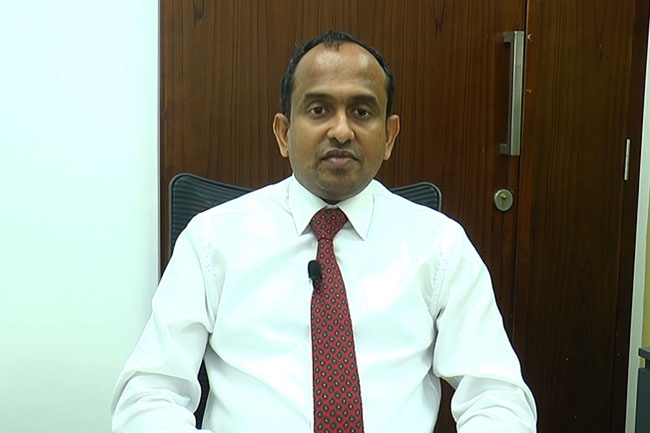Dr. Jeewandara urges public to remain vigilant as concerns over Omicron mount

Dr. Chandima Jeewandara, the Director of the Department of Immunology & Molecular Medicine at Sri Jayewardenepura, on Saturday urged Sri Lankans to continue to remain vigilant of the pandemic situation as global concerns mount over the highly mutated COVID-19 variant Omicron.
Speaking on the newly-detected SARS-CoV-2 variant of concern, Dr. Jeewandara said there are few cases in the world where people were infected despite being vaccinated against the virus. In the meantime, some people who were infected with the Delta variant of the virus had contracted the Omicron variant.
He explained that there is no concrete proven data to show that the Omicron variant can escape the vaccine-induced immunity or natural immunity. But based on the collection of mutations, scientists predict that it may escape antibodies produced by vaccines, he added.
Dr. Jeewandara urged the general public to get their booster dose of COVID-19 vaccine administered without delay. “The booster dose enhances our immunity. So, we will not have to worry even if the Omicron variant enters the country. Nobody, as of yet, knows what severe effects the Omicron variant could cause.”
The majority of Sri Lankans were fully vaccinated with the China-made Sinopharm COVID-19 vaccine, he said adding that the antibodies created by the vaccine went down after three months. Accordingly, Dr. Jeewandara stressed the importance of receiving the booster dose of the vaccine, especially for the elderly.
Speaking further, Dr. Jeewandara noted that the current efforts taken by the government to mitigate the spread of COVID-19 have been successful. The rules and regulations imposed on arrivals from overseas are also adequate, he explained.
With the latest developments and mirroring the decisions taken by multiple other countries, Sri Lanka also barred the arrival of foreign travellers who have been to six countries in the African continent.
Accordingly, passengers with a travel history – including transit – to South Africa, Namibia, Zimbabwe, Botswana, Lesotho and Eswatini (Swaziland) within the past 14 days are not allowed entry to the island nation with effect from midnight on 28 November.
Sri Lanka is equipped with the necessary laboratory facilities required to identify the virus strain, Dr. Jeewandara said stressing that Sri Lanka is well prepared for the situation.
The general public should not have any undue fears of the new coronavirus strain, he added.
“What needs to be done at present is to delay the Omicron variant from entering the country. We cannot prevent a virus strain from entering Sri Lanka forever.”
Delta variant of SARS-CoV-2 is the only strain still spreading in Sri Lanka, Dr. Jeewandara added.
The Omicron variant, which was first referred to as B.1.1.529, carries more than 30 mutations on the spike protein. Evidence also suggested an increased reinfection risk, according to findings.
The new variant was first reported to the World Health Organization (WHO) from South Africa on 24 November. It has also been identified in Botswana, Belgium, Hong Kong, Israel, the United Kingdom, Germany and Italy.
A molecular biologist at the Institute of Molecular Biotechnology in Vienna, Dr. Ulrich Elling said the first estimates have indicated that the new variant “might be 500% more infectious than Delta.”
